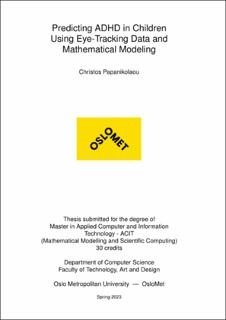| dc.description.abstract | Attention-Deficit/Hyperactivity Disorder (ADHD) is a prevalent neurobiological condition with far-reaching implications for a child's academic achievement, well-being, and social interactions. Despite its impact, current diagnostic methods, largely reliant on behavioral observations and subjective symptom reporting, may result in over-diagnosis or under-diagnosis. This thesis explores the potential of eye-tracking metrics and mathematical modeling as more objective and precise tools for ADHD diagnosis. We utilized a dataset from a visuospatial memory test involving children both with and without ADHD. The methodology encompasses a two-fold approach. Initially, we establish a benchmark classification model using non-eye-tracking metrics. Subsequently, we incorporate eye-tracking metrics derived from two mathematical models; the "Feed and Fly" and Lévy Flight models, contributing to our understanding of ADHD's complex nature. Our findings reveal that while the "Feed and Fly" model did not yield significant differentiation between ADHD and non-ADHD groups, the Lévy Flight model, especially when applied in an event-based analysis, showed potential in enhancing the benchmark model's performance. The final model refined to only three key metrics, each representing different analytical domains - WISC tests, eye-tracking data, and memory tests - emphasizing the necessity of a multi-faceted approach in diagnosing ADHD. Despite the limitations of the study, including questionable quality of the eye-tracking data and a small dataset size, our research highlights the promising potential of eye-tracking data and mathematical modelling in ADHD diagnosis, laying the foundation for future research in this field. We anticipate that this exploration will inspire further studies into more objective diagnostic tools, not only for ADHD but also for a wider range of cognitive disorders. | en_US |
